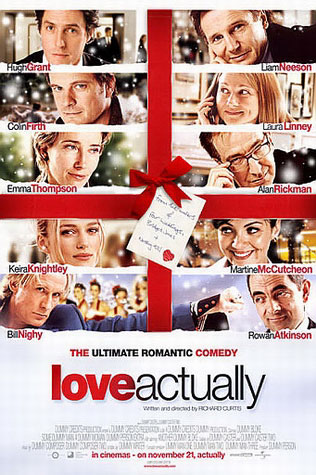Love, Sort Of
 So this is the tenth anniversary of Love, Actually, the British ensemble film that’s become a Christmas staple for a lot of us. I’ll go on record here as being a fan—I find the film funny and touching and ultimately charming. I’d much rather watch it than a lot of Christmas movies (::cough:: Miracle On 34th Street ::cough::). But as is the way with cultural phenomena, when a lot of people like something, you’ll eventually start getting pushback. Christopher Orr slammed Love Actually in the Atlantic. Lindy West went after it with a metaphorical hatchet in Jezebel. Other people weighed in with negative comments.
So this is the tenth anniversary of Love, Actually, the British ensemble film that’s become a Christmas staple for a lot of us. I’ll go on record here as being a fan—I find the film funny and touching and ultimately charming. I’d much rather watch it than a lot of Christmas movies (::cough:: Miracle On 34th Street ::cough::). But as is the way with cultural phenomena, when a lot of people like something, you’ll eventually start getting pushback. Christopher Orr slammed Love Actually in the Atlantic. Lindy West went after it with a metaphorical hatchet in Jezebel. Other people weighed in with negative comments.
The thrust of all these bad reviews is basically that Love, Actually is over-rated romantic tripe, and that people who like it are sentimental dummies. For those of us who occasionally fall for romantic comedies, these are familiar arguments—most romantic comedies get hit with nasty reactions at some point. But it seems to me this argument misses the point. It’s not a question of whether Love, Actually is good or bad. The question is why a critic feels called upon to go after people for liking something he/she doesn’t.
Criticism serves a purpose—a good critic can illuminate why something works or doesn’t work. But there’s something about this ex post facto criticism that grates. In a sense these critics aren’t so much analyzing the movie itself as they’re analyzing and dismissing the people who happen to like the movie. It reminds me of something William Goldman once said—snobby people can never really like anything because they’re afraid some even more snobby people will say, “Oh, so that’s the kind of thing you like.” In effect these critics are sneering at the movie’s fans: “How can you like something so puerile? Allow me to kick it to pieces to show you how mistaken you are in your bad taste.”
It isn’t just Love, Actually that gets hit by this kind of reaction. Pick a movie you like and do a quick search. You’ll usually find somebody who’s quite willing to tell you it sucks. Love Casablanca? Silly you. Some Like It Hot? Nope. Pauline Kael, that doyenne of movie critics, seemed to specialize in this kind of movie fan bashing at times, as witness her dismissal of the wildly popular Butch Cassidy and the Sundance Kid.
Love, Actually has a lot of admirers too, but it also has a lot of people who don’t like it. The important question is So What? So what if you don’t like a movie? Why should that mean you need to go after those who do? If you think you can convince them to dislike the movie, let me assure you that’s not going to happen. The idea that you can somehow persuade someone to dislike something they admire or like something they hate by giving them your own detailed hatchet job is sort of ludicrous.
Believe it or not, I don’t much like The Sound of Music, and I’m willing to bet I’m not alone in that opinion. Does that make The Sound of Music a bad movie? Nope. It just makes it a movie I don’t like very much. You are within your rights to like or dislike anything. But that doesn’t mean you get to make that decision for everybody else, or to make fun of those who don’t share your opinion. That’s not being a critic, that’s being a crank. And Lord knows we already have more than enough of those!
So if you haven’t seen Love, Actually, I invite you to check it out. And make up your own mind. It really doesn’t matter which critics like it and dislike it. What matters is your opinion. In the end, in fact, when it comes to choosing what film to see, that’s all that really does matter.
Posted in Blog • Tags: criticism, critics, Love Actually, On Movies | 4 Comments










Nice article. And thanks to the link to my old piece on overrated movies, even if I’m not quite as down as Casablanca as you make it seem!
For what it’s worth: I adored “Love, Actually”… Pretty sure it made me cry.
Glad you liked it–and yes, your article is the first one that pops up when you search “Casablanca” and “overrated”. 🙂
This happens with romance novels too, and the people who read them. Which is why I found myself defending 50 Shades of Gray – a lot of people read it and liked it. That disparaging term “mommy porn” is insulting to all of them.
Oh absolutely! Which is maybe why those of us who write romance are particularly sensitive to this kind of criticism.